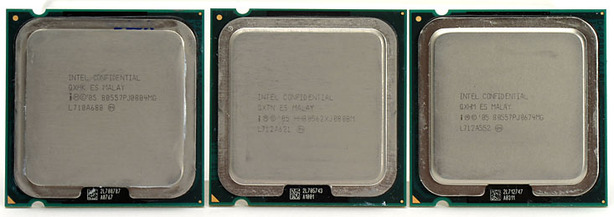
Final Thoughts...
It’s fair to say that with the introduction of these new processors with a 1333MHz front side bus, Intel has not only maintained its dominance in the CPU market, but also extended its performance lead. That, by and large, is thanks to the quite ridiculous price cuts that come into effect on July 22nd. They’re ridiculous because they’re so massive, but then AMD’s various price avalanches have been at least equal to Intel’s.Obviously, lower prices are good for the consumer and it’s something that Intel can stomach – the question is how much longer can AMD go on like this?
Well, Barcelona isn’t all that far away with its launch expected in August and although that’s a server processor, we’ve been told that the desktop version of the chip, Phenom, will launch around a month after Barcelona. The question is whether AMD can get the processor clocked high enough to not only compete with Intel at the high-end, but also at the lower price points too.

Now that Intel has lowered the price of its slowest quad-core processor to around £160 (inc. VAT), AMD has already got a price war on its hands even before its quad-core processors have launched and the chips apparently won’t ship for at least a month after launch. We’re hoping that Phenom’s performance will blow us away and make it worth the wait, but the problem at the moment is that Phenom is essentially an unknown quantity until it’s actually been tested. The question here is whether enthusiasts will be able to resist the lure of Intel’s Core 2 Quad Q6600 until Phenom arrives.
If you are dead set on an Intel CPU, obviously the question that I’m sure is on those people’s minds at the moment is whether you should opt for the Q6600 or the E6850, which are both at similar price points. Personally, I would opt for the quad-core processor every time, but that’s because I’m quite a heavy multi-tasker and I often find myself short of processing time on a dual-core processor. I like to be able to continue what I’m doing when I’m running a processor intensive task and, since most applications benefit from no more than two cores, you'll still have plenty of processing power available.
Add this to the fact that there are a slew of games coming out in the future that will benefit from quad-cores – Crysis is the first, and from what we’ve heard there are plenty more too. In recent times, games haven’t really benefited from high processor clock speeds because they’re graphics limited rather than CPU limited. This trend is going to continue, but as games engines get more complex, more will need to be done at any given point in time – that’s where quad-core processors will really come into their own.
Core 2 Extreme QX6850:
- Performance
- x
- x
- x
- x
- x
- x
- x
- x
- x
- x
- 10/10
- Value
- x
- x
- x
- x
- x
- -
- -
- -
- -
- -
- 5/10
- Overall
- x
- x
- x
- x
- x
- x
- x
- x
- -
- -
- 8/10
Core 2 Duo E6850:
- Performance
- x
- x
- x
- x
- x
- x
- x
- x
- -
- -
- 8/10
- Value
- x
- x
- x
- x
- x
- x
- x
- -
- -
- -
- 7/10
- Overall
- x
- x
- x
- x
- x
- x
- x
- x
- -
- -
- 8/10
Core 2 Duo E6750:
- Performance
- x
- x
- x
- x
- x
- x
- x
- x
- -
- -
- 8/10
- Value
- x
- x
- x
- x
- x
- x
- x
- x
- -
- -
- 8/10
- Overall
- x
- x
- x
- x
- x
- x
- x
- x
- -
- -
- 8/10

MSI MPG Velox 100R Chassis Review
October 14 2021 | 15:04








Want to comment? Please log in.